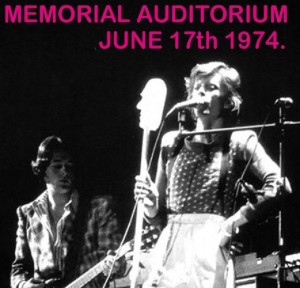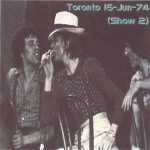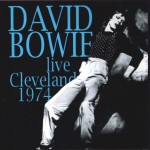David Bowie 1974-06-17 Rochester ,War Memorial Auditorium (21 tracks) (Diedrich).
Sound Quality Rating
01. 1984.flac
02. REBEL REBEL.flac
03. MOONAGE DAYDREAM.flac
04. SWEET THING.flac
05. CHANGES.flac
06. SUFFRAGETTE CITY.flac
07. ALADDIN SANE.flac
08. ALL THE YOUNG DUDES.flac
09. CRACKED ACTOR.flac
10. WHEN YOU ROCK ‘N’ ROLL WITH ME.flac
11. WATCH THAT MAN.flac
12. DRIVE IN SATURDAY.flac
13. SPACE ODDITY.flac
14. FUTURE LEGEND.flac
15. DIAMOND DOGS.flac
16. PANIC IN DETROIT.flac
17. BIG BROTHER.flac
18. TIME.flac
19. THE WIDTH OF A CIRCLE.flac
20. THE JEAN GENIE.flac
21. ROCK ‘N’ ROLL SUICIDE.wav
Label: none
Audio Source: audience
Lineage:
Total running time: 1:29:40
Sound Quality : Much noise ,dull ,but still good listened to
Attendance: 9.200
Artwork: none.
A fine concert,and a unique tape
Same as Toronto,but half of Jean Genie ,and Rock & Roll Suicide are missing.
The audience are very keen and when at the beginning of Sweet Thing they don’t see Bowie anymore,they get up. “Sit down,sit down!” a man cries and there is a great deal of yelling until the audience realise That Bowie is standing on the bridge.
A lot of screaming during Drive in Saturday too; I bet something was happening in the audience,but I don’t know wh a t . When Space Oddity starts there are again a lot of people who get up because they wonder where Bowie is and it takes them some time to find out that he is sitting over the audience. “He sit down,are you deaf!” the same man cries.
Many are impressed,crying “Oh my god!”,others are disappointed not to see Ziggy and they jeer at Bowie. “How could they not like this?” one can hear a man say during Time.
Tour band 1974 (June – July)
• David Bowie – vocals
• Michael Kamen – electric piano, Moog synthesizer, oboe, music director
• Earl Slick – guitar
• Mike Garson – piano, mellotron
• David Sanborn – alto saxophone, flute
• Richard Grando – baritone saxophone, flute
• Herbie Flowers – bass
• Tony Newman – drums
• Pablo Rosario – percussion
• Gui Andrisano – backing vocals
• Warren Peace – backing vocals
Toronto Star – 17 June 1974: Rock star
Bowie an appealing mystery
At one point during the first of his two O’Keefe Centre concerts last night, singer David Bowie danced to the edge of the stage where a girl was stretching her long arms in the air.
Her hands darted out, clutching at his pants, but Bowie danced away, remaining always beyond her reach.
It was as if no one would ever touch him, as if he wasn’t quite real.
Everything about Bowie’s appearance has this sense of unreality. The 6,400 tickets available for the two shows were sold out a month ago even though the top price was $6.80, there wasn’t a single word of advertising, and the 27-year-old Bowie himself is something of a mystery.
Yet it’s this mystery, with its hint of divine decadence, that makes him so appealing. Everywhere in the crowd outside the hall during the 30-minute delay before his first show began, you could see hints of his sexually ambiguous, futuristic style.
A couple of confusing gender strolled through the crowd, one dressed in a short, frilly pink slip, the other’s mouth smeared with frosted lip gloss. One girl, otherwise normally dressed, was wearing an enormous pair of bat’s wings. And elsewhere among the jeans and T-shirts you could see lilac lipstick, tangerine eyes, hair dyed Bowie’s rusty-red color, and the familiar Bowie lightning-bolt zigzag painted on people’s faces.
But even all this was nothing compared to Bowie’s show.
The set, taken more or less from the jacket design for his latest album, Diamond Dogs (RCA CPLI-0576) was filled with mis-shapen skyscrapers (plus one rather pornographic image) leaning eerily every which way.
One column on the left concealed a hoist that floated the singer through the air during a song about space. And high above the stage, a bridge with several lights emphasizing its bleakness completed the harrowing cityscape.
Despite the one hour and 40 minutes of solid satisfying rock, the show’s theme was the bombed-out future of George Orwell’s 1984. This, as Bowie’s voice intoned over some moaning electronic music, was where “fleas the size of rats sucked on rats the size of cats, and ten thousand peoploids split into small tribes, coveting the highest of the sterile skyscrapers.”
In all this, Bowie became a future Everyman who, in Sweet Thing, was hopelessly looking for love of any kind or who, in Big Brother, was cynically looking for a hero of any kind.
Bowie’s voice showed a remarkable flexibility and range of sounds coupled with his abilities as a dancer and a mime.
The show itself may have been a rock version of early Baroque opera, where the set often took precedence over the music, but Bowie knew exactly what to do.
In fact, he is undoubtedly the first rock star to actually use theatrics as part of a total presentation.
With his band on stage right, and two male singers-cum-dancers swirling around him, Bowie controlled everything, right in the moment when he was wheeled out inside a mirrored capsule that opened to show him off like some precious jewel.
At this point, with dozens of fans clustered at the front of the stage, their arms out-stretched, Bowie seemed like something from another planet. And this, of course, was exactly what he had planned.
PETER GODDARD



